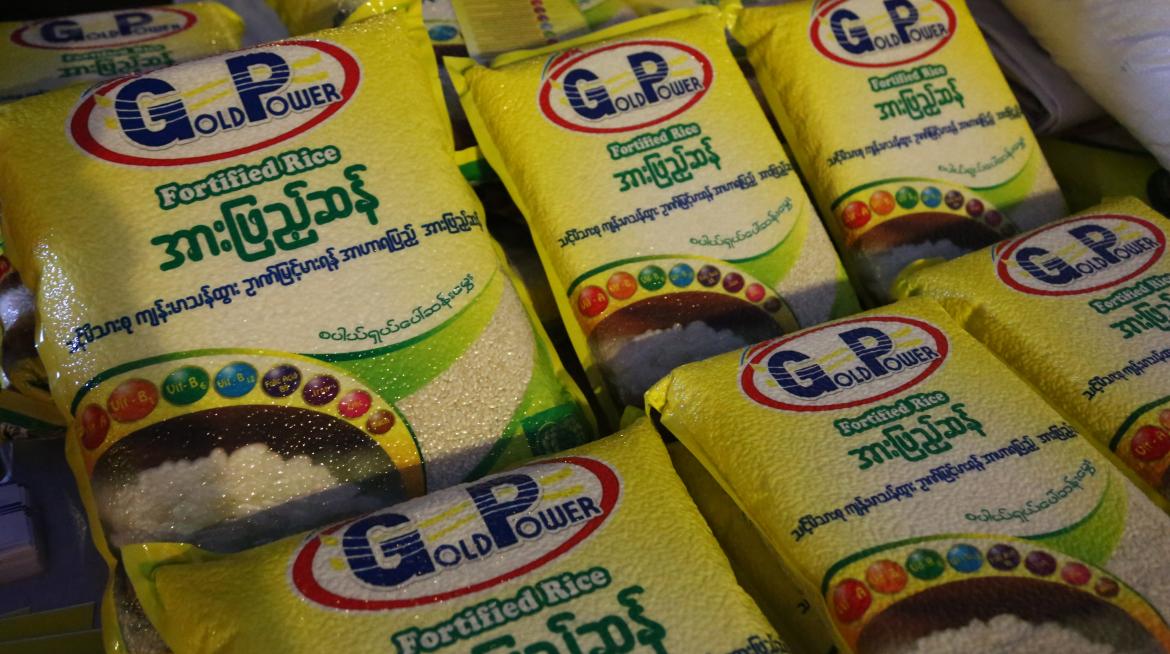
With support from LIFT, PATH and its partners are one step closer to tackling Myanmar’s most pressing issues – poverty and malnutrition. Myanmar’s Food and Drug Administration (FDA) has recently approved three of PATH’s private-sector partners in their initiative to introduce fortified rice to Myanmar: Gold Power, Excel, and Swan Htet Myet, all fortified rice production plants. The FDA approval signals crucial quality assurance to actors along the value chain – from producers, distributors, and retailers to consumers. It is expected that this approval will substantially increase the demand for fortified rice in the country. Already, immediately following the issuance of the approval, the production plants received an order for fortified rice for 33 retail outlets from Myanmar’s largest supermarket chain, City Mart.
 Fortified rice is regular rice with specially manufactured vitamin- and mineral-enriched kernels mixed in. In Myanmar, these fortified kernels each include a government-approved dose of iron, zinc, vitamin A, and vitamins B1, B3, B6, B9, and B12. By embedding these (Photo credit: PATH)
Fortified rice is regular rice with specially manufactured vitamin- and mineral-enriched kernels mixed in. In Myanmar, these fortified kernels each include a government-approved dose of iron, zinc, vitamin A, and vitamins B1, B3, B6, B9, and B12. By embedding these (Photo credit: PATH)
elements in a staple food, PATH Ultra Rice® technology increases people’s access to essential micronutrients.
Myanmar is among the world’s poorest countries, ranking 148 out of 173 on the 2015 United Nations Development Programme (UNDP) Global Development Index. It has the lowest life expectancy and the second-highest rate of infant and child mortality among the Association of Southeast Asian Nations (ASEAN) countries. Approximately 41 per cent of children under the age of five suffer from stunting. With an annual per capita rice consumption rate of 190 kilograms, Myanmar is one of the highest consumers of rice in the world. As a country that is dependent on rice both as a staple food and as the major, sometimes only, source of nutrition, fortified rice is pivotal to delivering simple and effective health benefits.
PATH’s project to introduce fortified rice to Myanmar promotes the direct purchase of fortified rice by consumers, as well as the distribution of the rice through existing food and nutrition programs supported by the government and nongovernmental organizations (NGOs). The project increases access to essential micronutrients, critical to early development of children and the overall health of the population. Notably, it does this without requiring significant behavioural changes, working instead within people’s established dietary habits to deliver key nutrients. Moreover, as rice is Myanmar’s most predominant segment in agriculture and agribusiness, introducing new fortified rice products boosts activity in this sector, creating much-needed employment opportunities with the potential to generate more growth. Once PATH’s partners have secured the technology and the skills needed from PATH, they can continue to grow their businesses, expanding an entirely new market in the most traditional of sectors in Myanmar, promoting public health as they do so.
LIFT is supporting PATH in introducing and commercialising fortified rice. In collaboration with the National Nutrition Centre, the project is promoting direct purchase of fortified rice by consumers as well as distribution to existing food and nutrition programmes supported by the government and NGOs.
Improved nutrition was prioritised in the updated LIFT strategy (2014) as one of four major desired outcomes. The programmes LIFT developed in 2015 were designed to reduce stunting through multiple approaches. The number of implementing partners promoting nutrition through their projects has risen dramatically. Twelve LIFT grants awarded in 2015 are nutrition-specific or sensitive, twelve organisations include nutrition objectives in their projects and ten new projects include nutrition promotion or education activities.
Read more about fortified rice here.
This article was written by Jenny Boylan, Senior Communications Officer at PATH.


